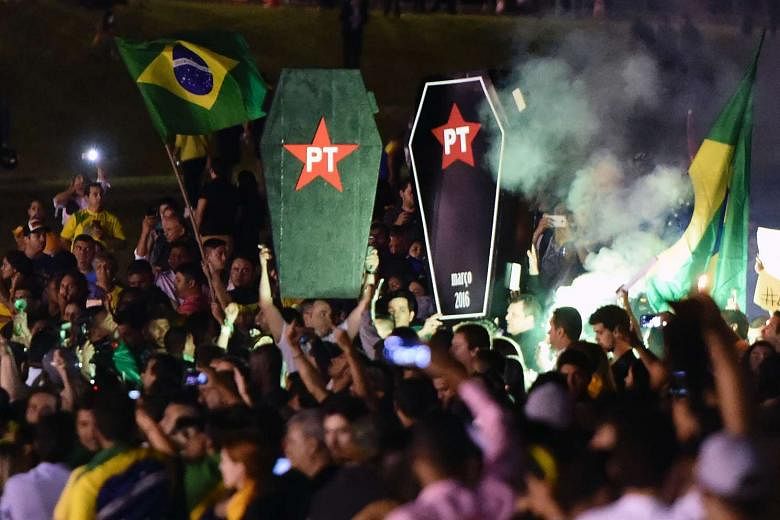SAO PAULO/BRASILIA (Reuters) - Brazilian riot police fired water cannon and tear gas to disperse anti-government protesters in central Sao Paulo on Friday (March 18), while in Congress opponents of President Dilma Rousseff started the clock ticking on impeachments sessions.
The anti-government protesters had blocked Sao Paulo's central Avenue Paulista since Wednesday evening when demonstrations erupted against the appointment of former President Luiz Inacio Lula da Silva as a minister.
Opponents say his nomination is designed to help Lula evade prosecutors who have charged him with money laundering and fraud. Only Brazil's Supreme Court has jurisdiction in cases against ministers.
A federal judge issued an injunction to suspend his appointment on Thursday on the grounds that it was impeding the judicial process. The attorney-general said he would appeal this.
Authorities dispersed opposition demonstrators from Sao Paulo's Avenue Paulista to avert possible clashes with a pro-government rally planned in the same area for Friday afternoon. Lula was due to address that gathering.
In Brasilia, where thousands of demonstrators have demanded Rousseff's ouster over the last two days, police told protesters to stay away from the Congress building where a pro-government demonstration was planned for 5 pm local time (2000 GMT).
In Congress' lower house, opposition parties sped up the impeachment of Rousseff by holding a session on Friday, a day that lawmakers are normally away from Brasilia.
The president has 10 sessions of the house to present her defence and - even though the special impeachment committee did not meet on Friday - the clock started ticking. The impeachment case is centered on allegations that Rousseff broke budget rules to boost spending as she campaigned for re-election in 2014.
Antonio Imbassahy, the leader of the opposition Social Democratic Party of Brazil (PSDB) party in the lower house, lawmaker from Bahia, said the committee could present its finding by mid-April.
Rousseff appointed Lula, who remains one of Brazil's most influential politicians six years after leaving office, in an effort to fight impeachment and win back working-class supporters amid the worst economic recession in decades.
But his appointment has been overshadowed by the release of taped telephone conversations between Rousseff and Lula that a crusading anti-corruption judge said showed them discussing how to interfere with his investigation into a massive corruption scheme centred on state oil company Petrobras.
The release of the recordings has inflamed tensions that were already running high between the judiciary and government.
"This was illegal," Rousseff told a rally on Friday. "Only the Supreme Court has the authority to wire tap a president."
In another tape made public on Friday, the president of the ruling Workers' Party was heard asking Rousseff's then-chief of staff Jaques Wagner to intervene after Sao Paulo prosecutors requested Lula's arrest.
"Alert the president. There needs to be a State decision", said Rui Falcao. "You have to do something, because the state judge may decide today." Wagner answered: "Ok, let me do something here." Lula and Rousseff both deny any wrongdoing.

